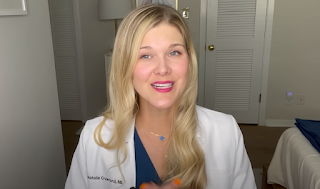 |
| Dr Natalie Crawford six easy suggestions you need to know to help you get pregnant if you want to get pregnant now or in the future Credit: Instagram/NatalieCrawfordMD |
Some people may have a difficult time getting pregnant.
It can be challenging to keep track of your periods, to plan constantly, and to not have two lines on your tests.
The six easy suggestions you need to know to help you get pregnant have finally been made public by a reproductive specialist.
Dr Natalia Crawford, a specialist at the Fora Fertility Clinic in Texas, stated on Instagram that the advise is applicable whether you want to become pregnant right away or in the future.
She said:
"Your period and your fertility can be impacted by the world around you and these tips can help you preserve your fertility and Improve your egg quality-both now and later.
"If you want to be pregnant now, or someday-then learn about your body and lifestyle so you can optimise your fertility."
Below are the Tips suggested by Dr Natalia Crawford to help you get pregnant.
- PULL IT OUT
She stated that the first thing to keep in mind is that you shouldn't be using marijuana or cigarettes.
"Smoking cigarettes for a long time has been researched, and we know that it reduces the quantity of eggs that you have," Dr. Crawford said.
Now, only a select few things can result in an early egg runout.
She continued by pointing out that smoking lowers egg quality and increases egg abnormalities.
"The greatest thing we notice is that your ovarian reserve is smaller and that you have a lower likelihood of becoming pregnant each month.
You also enter menopause earlier, she added.
She added that patients who use marijuana have impaired ovulation, an altered luteal phase, and a reduction in embryo development, despite the fact that this topic has received less research.
- REDUCE PLASTIC
She advised you to restrict your use of plastics because they can worsen abnormalities in your eggs.
The guru advised against heating plastics in the microwave or dishwasher or drinking water from plastic containers.
"Those plastics come into contact with endocrine disrupting substances, or EDCS (Endocrine-disrupting chemicals), which can interfere with the production of hormones by the brain and the ovaries."
She advocated drinking from glass, stainless steel, or aluminum instead than plastic drinking cups.
She also mentioned that you shouldn't place plastics close to any heat-producing surfaces because doing so will result in chemical to leak out of them.
- GUARD YOURSELF
The final action you must take, according to the expert, is to safeguard yourself against sexually transmitted diseases (STIs).
Nobody desires to go out and obtain one. However, if you want to avoid STIs, you should consider using condoms.
"Chlamydia significantly affects the fallopian tubes. This means that if you've ever had it, even a minor infection for which you received antibiotics, it could have irreversibly damaged your fallopian tubes and may force you to have IVF in the future.
She advised getting a test to see if your tubes have been harmed by the virus if you've already had the STI.
- REDUCE EATING PROCESSED FOODS
You should also restrict the amount of processed food you eat, according to Dr. Crawford.
Particularly processed meat or refined meals, she added. Studies on embryo development have shown that people who consumed more red and processed meat during an IVF cycle had poorer overall embryo growth.
"It shouldn't be something you consume every day, but if you're trying to get pregnant, you can have it just once a week," I typically advise my patients.
She continued by saying that these items are frequently wrapped in plastic and may have refined sugars.
These, according to her, can mess up your insulin cycle, which could then affect ovulation.
Examine your diet carefully, place a priority on whole grains, and steer clear of processed meat, she said.
- MONITOR YOURSELF
While you might assume you should put up with Aunt Flo's visit, Dr. Crawford advised you to be aware of your period.
If your menstruation is irregular, she claimed, it's telling you something.
She did, however, caution that your period isn't necessarily a good indicator if you are using birth control, such as the pill.
According to Dr. Crawford, you should stop using birth control six months before you wish to become pregnant.
She claimed that by doing this, your period will "unveil itself," and you may start monitoring it to see what is typical for you.
Visit your doctor if there is an excessive amount of variance.
You need to know what it's teaching you about how your body is functioning, she continued.
According to Dr. Crawford, your period may occasionally serve as a gauge of how much or little ovarian reserve you have.
- AGE MATTERS
Finally, Dr. Crawford advised not to disregard your age.
When it comes to reproductive treatment, "age is still the number one predictor of success," she added.
People can become pregnant as they age, she continued, but it is uncommon.
"Your likelihood of becoming pregnant each month when you're 40 and attempting to conceive is around 5%.
"It's closer to 20% a month when you're younger, and that makes a big impact."
She praised you for delaying this for the sake of your professional chances but advised that you consider whether you want more children before considering beginning a family earlier.
Even if you are healthy, nothing can reverse aging, according to Dr. Crawford.
It's crucial to remember that her videos are intended to educate viewers; if you require advice or you are having difficulty conceiving, you should consult your doctor.
ALSO READ : 11 ways to manage back pain effectively
